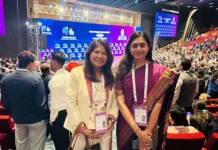KOHIMA, 8 Jun: A Naga delegation comprising leaders and elders of several Naga tribe hohos, members of the Forum for Naga Reconciliation (FNR) and Recover, Restore and Decolonise (RRaD) team is on a weeklong visit to the Pitt Rivers Museum (PRM), University of Oxford in UK from 8 June, for strengthening the process of repatriating Naga ancestral human remains currently under the care of the PRM.
Since November 2020, the FNR has been serving as a facilitator to seek the Naga people’s consent, participation and active support, specifically from the Naga hohos. To enable the process of identifying, claiming and eventually recovering the Naga ancestral human remains, the FNR formed the RRaD team to conduct “participatory action research” with Naga communities. The RRaD’s efforts are generating public awareness and strengthening networks with other indigenous nations regarding the recovery of ancestral remains from various parts of the world, said the FNR in a release.
“The Naga delegation’s visit is a momentous occasion for the Naga people.
It is the first time in Naga history that the PRM, which holds the largest Naga collection in the world, will be hosting a Naga delegation that will be given access to the ancestral human remains. The delegation looks forward to collaborating with museum staff through dialogue, co-learning, and discussing how the museum cares for ancestors, as well as closely examining the return process and the way forward,” it said.
The focus of this visit will be around the repatriation of remains held in the collections of the Pitt Rivers Museum, alongside the future of Naga collections, the NRR said, and further informed that “altogether around 219 Naga ancestral human remains are under the care of the PRM.”
“At this historic time,” the FNR said, it is reaching out to the Naga people for support and solidarity. “A Naga pathway to repatriation needs to be dynamic and robust,” it said and added that, “as a facilitator, the FNR is open to engaging in dialogue and continues to invite suggestions and constructive criticism as we make the way forward together.”

